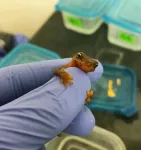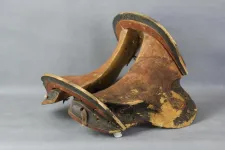(Press-News.org) Smoking shrinks the brain, according to a study by researchers at Washington University School of Medicine in St. Louis. The good news is that quitting smoking prevents further loss of brain tissue — but still, stopping smoking doesn’t restore the brain to its original size. Since people’s brains naturally lose volume with age, smoking effectively causes the brain to age prematurely, the researchers said.
The findings, published in Biological Psychiatry: Global Open Science, help explain why smokers are at high risk of age-related cognitive decline and Alzheimer’s disease.
“Up until recently, scientists have overlooked the effects of smoking on the brain, in part because we were focused on all the terrible effects of smoking on the lungs and the heart,” said senior author Laura J. Bierut, MD, the Alumni Endowed Professor of Psychiatry. “But as we’ve started looking at the brain more closely, it’s become apparent that smoking is also really bad for your brain.”
Scientists have long known that smoking and smaller brain volume are linked, but they’ve never been sure which is the instigator. And there is a third factor to consider: genetics. Both brain size and smoking behavior are heritable. About half of a person’s risk of smoking can be attributed to his or her genes.
To disentangle the relationship between genes, brains and behavior, Bierut and first author Yoonhoo Chang, a graduate student, analyzed data drawn from the UK Biobank, a publicly available biomedical database that contains genetic, health and behavioral information on half a million people, mostly of European descent. A subset of over 40,000 UK Biobank participants underwent brain imaging, which can be used to determine brain volume. In total, the team analyzed de-identified data on brain volume, smoking history and genetic risk for smoking for 32,094 people.
Each pair of factors proved to be linked: history of smoking and brain volume; genetic risk for smoking and history of smoking; and genetic risk for smoking and brain volume. Further, the association between smoking and brain volume depended on dose: The more packs a person smoked per day, the smaller his or her brain volume.
When all three factors were considered together, the association between genetic risk for smoking and brain volume disappeared, while the link between each of those and smoking behaviors remained. Using a statistical approach known as mediation analysis, the researchers determined the sequence of events: genetic predisposition leads to smoking, which leads to decreased brain volume.
“It sounds bad, and it is bad,” Bierut said. “A reduction in brain volume is consistent with increased aging. This is important as our population gets older, because aging and smoking are both risk factors for dementia.”
And unfortunately, the shrinkage seems to be irreversible. By analyzing data on people who had quit smoking years before, the researchers found that their brains remained permanently smaller than those of people who had never smoked.
“You can’t undo the damage that has already been done, but you can avoid causing further damage,” Chang said. “Smoking is a modifiable risk factor. There’s one thing you can change to stop aging your brain and putting yourself at increased risk of dementia, and that’s to quit smoking.”
END
Smoking causes brain shrinkage
Findings help explain how smoking is linked to Alzheimer’s, dementia
2023-12-12
ELSE PRESS RELEASES FROM THIS DATE:
Mammogram rates increase when patients schedule themselves
2023-12-12
PHILADELPHIA— Having the ability to self-schedule mammograms was associated with a 15 percentage point increase following through with getting the screening, according to research from the Perelman School of Medicine at the University of Pennsylvania. The paper was published today in the American Journal of Preventive Medicine.
“Self-scheduling helps make the path to mammogram completion a little smoother, where you don’t have to find the time to call a scheduling line, wait on hold, or go back and forth trying to find an appointment that works for your schedule,” said the study’s lead author, Kimberly Waddell, ...
Protein study could one day advance Parkinson’s, breast cancer care
2023-12-12
PORTLAND, Oregon -- New research from Oregon Health & Science University could one day lead to therapies that prevent or treat diseases and infections tied to a protein that’s found in all human cells.
A study published today in the journal Molecular Cell describes how the protein ubiquitin is modified during a bacterial infection. The study details the steps taken to create a form of the protein known as lysine 6 polyubiquitin, where a long chain of ubiquitin molecules are linked through ...
Study exposes opportunities for strengthening cancer drugs trials in China
2023-12-12
More than one-eighth of the randomized trials of cancer drugs seeking regulatory approval in China in recent years used inappropriate controls to test the effectiveness and safety of the drugs, according to a new study published December 12th in the open access journal PLOS Medicine by Professor Xiaodong Guan of Peking University, China, and colleagues.
In randomized trials, patients are assigned to either a control arm, in which they receive the current optimal treatment, or an experimental arm, in which they receive the new drug being tested. However, studies have previously ...
Zapping manure with special electrode promises an efficient method to produce fertilizers, other chemicals
2023-12-12
MADISON – An interdisciplinary team led by University of Wisconsin–Madison scientists has developed a new technique that could help farmers extract useful nutrients such as ammonia and potassium from livestock manure to efficiently make fertilizer and other useful chemical products. While the strategy still needs to be scaled up beyond a proof-of-concept stage, the group's preliminary analyses show it could offer considerable benefits by cutting water and air pollution while simultaneously creating products that farmers could use or sell.
Manure stinks in part because it contains ammonia, one of the more ...
Novel early-detection method aims to stem disease spread in animal trade
2023-12-12
DENVER/Dec. 12, 2023 – A new article published in the journal Methods in Ecology and Evolution by Morris Animal Foundation-funded researchers describes a simplified method to detect a deadly fungus killing European salamanders. The ability to rapidly find the fungus is significant as the disease, although not detected in the U.S., could impact the millions of amphibians and salamanders annually imported.
The fungal pathogen Batrachochytrium salamandrivorans, or Bsal, threatens salamander diversity. Initially identified in northern Europe, evidence suggests it was introduced from Southeast Asia via the pet trade.
“The impacts of Bsal ...
EMBO launches new award for sustainability in the lab
2023-12-12
EMBO launches a new award for laboratory sustainability: The EMBO Lab Sustainability Award will recognize new and significant contributions to the development of sustainable wet and dry labs with a focus on their environmental impact. The award will be presented to an individual representing the initiative or project. Applications can be submitted between 15 January and 15 March 2024.
The award winner will have the opportunity to present their initiative or project at scientific events and publish a commentary in EMBO Reports. In addition, the winning project will be supported with a grant of 10,000 euros. The award is one of ...
Clinical trial finds cell therapy improves quality of life in advanced heart failure
2023-12-12
ROCHESTER, Minn. — Stem cell-based therapy improved quality of life for patients with advanced heart failure, Mayo Clinic researchers and international collaborators discovered in a late-stage multinational clinical trial. In one of the largest studies of cell intervention after a heart attack, patients reported their daily hardship lessened when stem cells optimized for heart repair supplemented standard of care. This clinical study further documented lower death and hospitalization rates among those treated with cell therapy. This research ...
ASH: Mantle cell lymphoma patients see improved outcomes with oral combination of ibrutinib and venetoclax
2023-12-12
ABSTRACT: LBA-2
SAN DIEGO ― The targeted therapy combination of ibrutinib and venetoclax significantly improved progression-free survival (PFS) and achieved an overall remission rate in 82% of patients with relapsed/refractory mantle cell lymphoma (MCL), according to researchers at The University of Texas MD Anderson Cancer Center. Results from the Phase III SYMPATICO trial were presented at the 2023 American Society of Hematology (ASH) Annual Meeting.
At a median follow-up of 51.2 months, median PFS was 31.9 months with the combination compared to 22.1 months with ibrutinib plus placebo. PFS benefits were consistent across patient subgroups, including those with blastoid-variant ...
New test predicts risk of cognitive dysfunction in older surgery patients
2023-12-12
DURHAM, N.C. – Identifying an older patient who is at risk for post-operative cognitive dysfunction might be done in the blink of an eye – literally.
Researchers at Duke Health found that a simple EEG measurement detects a signal of cognitive vulnerability when patients are asked to close, then open their eyes. Conducted prior to surgery, the non-invasive readout of brain waves helps predict which patients are at risk of post-operative confusion and attention problems.
“Roughly half of seemingly normal older adults experience problems with thinking, memory or attention after surgery,” said Leah Acker, M.D., Ph.D., assistant professor in ...
Archaeologists unearth one of earliest known frame saddles
2023-12-12
In April 2015, looters sacked an ancient cave burial at a site called Urd Ulaan Uneet high within the Altai Mountains of western Mongolia. When police apprehended the criminals, they uncovered, among other artifacts, an elegantly carved saddle made from several pieces of birch wood.
Now, in a new study, researchers from Mongolia collaborating with University of Colorado Boulder archaeologist William Taylor have described the find. The team’s radiocarbon dating pins the artifact to roughly the 4th Century ...
LAST 30 PRESS RELEASES:
The Lancet: First-ever in-utero stem cell therapy for fetal spina bifida repair is safe, study finds
Nanoplastics can interact with Salmonella to affect food safety, study shows
Eric Moore, M.D., elected to Mayo Clinic Board of Trustees
NYU named “research powerhouse” in new analysis
New polymer materials may offer breakthrough solution for hard-to-remove PFAS in water
Biochar can either curb or boost greenhouse gas emissions depending on soil conditions, new study finds
Nanobiochar emerges as a next generation solution for cleaner water, healthier soils, and resilient ecosystems
Study finds more parents saying ‘No’ to vitamin K, putting babies’ brains at risk
Scientists develop new gut health measure that tracks disease
Rice gene discovery could cut fertiliser use while protecting yields
Jumping ‘DNA parasites’ linked to early stages of tumour formation
Ultra-sensitive CAR T cells provide potential strategy to treat solid tumors
Early Neanderthal-Human interbreeding was strongly sex biased
North American bird declines are widespread and accelerating in agricultural hotspots
Researchers recommend strategies for improved genetic privacy legislation
How birds achieve sweet success
More sensitive cell therapy may be a HIT against solid cancers
Scientists map how aging reshapes cells across the entire mammalian body
Hotspots of accelerated bird decline linked to agricultural activity
How ancient attraction shaped the human genome
NJIT faculty named Senior Members of the National Academy of Inventors
App aids substance use recovery in vulnerable populations
College students nationwide received lifesaving education on sudden cardiac death
Oak Ridge National Laboratory launches the Next-Generation Data Centers Institute
Improved short-term sea level change predictions with better AI training
UAlbany researchers develop new laser technique to test mRNA-based therapeutics
New water-treatment system removes nitrogen, phosphorus from farm tile drainage
Major Canadian study finds strong link between cannabis, anxiety and depression
New discovery of younger Ediacaran biota
Lymphovenous bypass: Potential surgical treatment for Alzheimer's disease?
[Press-News.org] Smoking causes brain shrinkageFindings help explain how smoking is linked to Alzheimer’s, dementia


